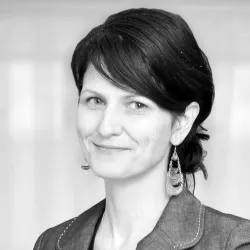Pushing Through the Cracks: Youth, Empathy, and Canadian Institutions
From environmental and social justice to incarceration to healthcare and parenthood, three Foundation scholars examine youth and its relationship to institutions in Canada.
What will it take to unleash the potential of Canadian youth today? For a growing number of Foundation scholars, answering that question raises others: the extent to which Canadian youth experience empathy, and the degree to which Canadian institutions are open to change.
“A lot of the rhetoric in Canada portrays youth as detached, individualistic, more interested in their social media profiles than in anything else,” says Rebeccah Nelems, a 2015 Pierre Elliott Trudeau Foundation scholar. “Several quantitative studies suggest that North American youth lack empathy. But my research suggests that Canadian youth are not detached, but disillusioned. They care about poverty, the environment, and social inequalities, but they are convinced that many of our institutions are set up to reproduce these things. When given the chance to act, they jump on it.”
Over the course of 2018, Rebeccah will spend time in Ecuador, where a 2017 study recorded the highest levels of empathy among 63 countries surveyed. 2018 marks the ten-year anniversary since Ecuador formally extended rights to nature in its constitution; to date, some two dozen court cases have gone forward with a natural entity as the plaintiff. The changes reflect the formal inclusion of relational worldviews reflective of many Indigenous peoples and Afro-descendants living in the country. Rebeccah suspects a link between these worldviews and empathy in the population.
“My research will ask young people – both in Canada and in Ecuador – how they are navigating two very different worldviews that coexist in this moment of time: a highly relational worldview reflecting Indigenous and ecological conceptions of interconnectivity, and the individualist, anthropocentric, and colonial system that characterizes most North American governance systems and institutions. How do young people in these contexts experience citizenship, belonging, and responsibility? How do they experience connection through social media and in other domains of their lives? In addition, Ecuador boasts a mass environmental movement (the Yasunidos) that is essentially youth-based. What explains its success? I suspect I may find lessons for home.”
Empathy and the experiences of youth also motivate the work of 2017 scholar Sophie de Saussure, who is investigating the extent to which Canada’s criminal sentencing system weighs the social consequences of punishment. “Generally speaking, Canadian law is quite sensitive to child protection. When it comes to penal law, though, criminal justice is unable to see how it affects children once applied. Prison sentences place tremendous stress on the relationship between the offender and the offender’s family. Yet this relationship is key to rehabilitating the offender.”
Sophie explains. “Children are probably the primary motivator for parents working to rehabilitate themselves. They allow the offender to experience empathy, responsibility, and caring. For that reason alone, it is unproductive for sentences to separate parents from their children for long periods without frequent contact. But sentences like this are also unfair to offenders’ children, who are an innocent party to the crime. Researchers estimate that approximately 42,000 Canadian children are affected by a parent’s time in prison: many of them experience stigma, financial hardship, and serious mental and emotional health issues as a consequence. Sometimes those harms undermine their future. Yet these children are invisible in the public sphere: no public policy addresses their needs. I hope that my research will help our legal systems better consider offenders’ social ties – to their children and to others – and give offenders’ children special protection.”
How far are we from there? Sophie doesn’t know, but she makes a last point. “We hear a lot about the crisis of Indigenous children in care,” she says, “but we don’t seem to connect it to the fact that Indigenous people are grossly overrepresented in Canada’s prisons. The issues are treated as if they were independent. A criminal justice system that would try to keep offenders in the community, instead of excluding them, would be an important step towards solving the children-in-care crisis as well as a host of other social problems. It would benefit entire communities, not only for now, but for generations to come.”
Like Sophie, 2016 scholar Anna Dion is interested in the generations to come, starting with young pregnant women. “Canada’s healthcare and social support systems are built around a mainstream, idealized concept of motherhood that doesn’t always correspond to the experiences of many adolescent mothers and other marginalized women,” says Anna. “Many young women who become pregnant and choose to parent are already battling isolation, stigma, and financial hardship. They are more likely to be single, are two to four times more likely to have experienced physical abuse in the past year, and are at greater risk for postpartum depression. Despite best intentions, institutions often exacerbate these challenges by treating these women as irresponsible or unmotivated, and by imposing solutions that aren’t appropriate for them.”
Anna is testing a system designed to help marginalized pregnant women, healthcare providers, and other stakeholders in the perinatal care system work together to recommend services that better meet marginalized women’s needs and help providers and policy-makers erode persistent health inequalities. To get there, she will start by investigating how women’s needs, as expressed by women themselves, differ from what the professionals see as both priorities and solutions.
“Most of the women I speak with are highly motivated by their pregnancy,” says Anna. “They want to provide the best for their family, and they know they may need help. The absence of critical supports – such as income support, safe and affordable housing, accessible mental health services, and connections with family or their communities – often means that the circumstances in which young families find themselves are perceived as risks to their child. Instead of interpreting these challenges as signs of inadequate parenting, we need to understand them as an urgent call for more comprehensive support for families. We need to better balance support and surveillance, and create spaces within our institutions for marginalized mothers and all families to feel heard, trusted, and supported in their decisions.”
For Anna, as for Sophie and Rebeccah, path dependency, not a lack of empathy, is the main barrier to change. Canadian youth face institutions that were set up by their parents’ or grandparents’ generation, and often resist evolution. Perhaps a youth-based perspective on social issues – whether environmental and social justice, or incarceration, or healthcare and parenthood – is the first step toward leveraging a potential that will benefit youth, certainly, but all of us as well.
21 March 2018




